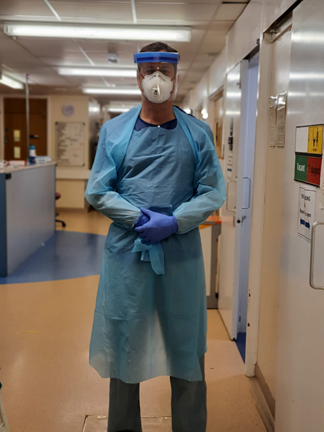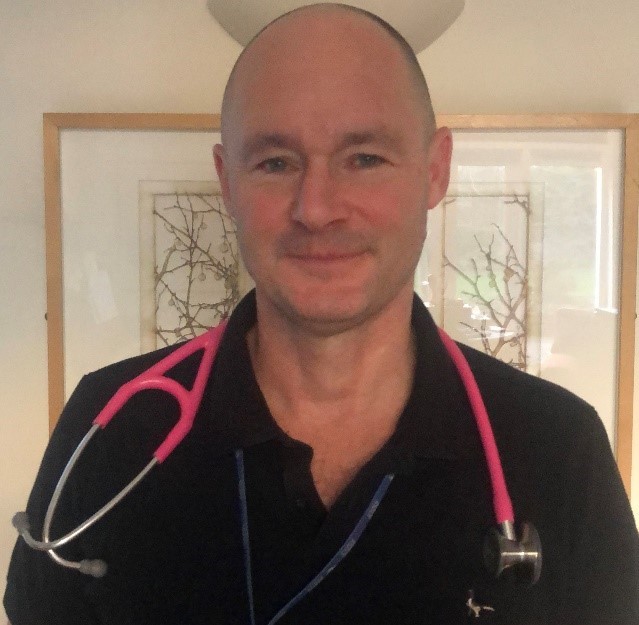January 26, 2021, by School of Medicine
Respiratory Medicine and Covid-19
Over the past ten months, the Nottingham University Hospital’s clinical response to the Covid-19 pandemic has taken up most of the available time and resources of the Medical School’s Division of Respiratory Medicine, and its associated clinicians.
 Professor Dominick Shaw had just started as Head of Respiratory Medicine for Nottingham University Hospitals when the first cases of Covid-19 coronavirus were identified in Wuhan, China in December 2019, and has since found himself in the hot seat of having to navigate the local NHS frontline clinical response to the Covid-19 pandemic in a rapidly evolving, unprecedented national emergency. As well as leading from the front by plugging the gaps in 24-hour rotas as clinicians became infected with Covid-19 themselves, liaising with colleagues in China and Spain, becoming an expert on how to pipe adequate oxygen through 50 year old wards which were never designed for emergency respiratory medicine, setting up a local rapid point of care testing facility when Boris was still talking about his ‘moonshots’, he also rewrote the local pneumonia guidelines so there wasn’t a shortage of antibiotics.
Professor Dominick Shaw had just started as Head of Respiratory Medicine for Nottingham University Hospitals when the first cases of Covid-19 coronavirus were identified in Wuhan, China in December 2019, and has since found himself in the hot seat of having to navigate the local NHS frontline clinical response to the Covid-19 pandemic in a rapidly evolving, unprecedented national emergency. As well as leading from the front by plugging the gaps in 24-hour rotas as clinicians became infected with Covid-19 themselves, liaising with colleagues in China and Spain, becoming an expert on how to pipe adequate oxygen through 50 year old wards which were never designed for emergency respiratory medicine, setting up a local rapid point of care testing facility when Boris was still talking about his ‘moonshots’, he also rewrote the local pneumonia guidelines so there wasn’t a shortage of antibiotics.
He has been supported by Professor Richard Hubbard who has been using his expertise in modelling to present data to the Nottingham University Hospital’s management team to inform them on anticipated patient flow; these data have been remarkable in their ability to predict future admissions with Covid-19 cases, and the total number of beds required. Nationally they are one of the most accurate datasets available.
 Dr Andrew Fogarty has assisted in helping develop the staff testing programme as well as taking the initiative to educate the small army of doctors who have had to pivot to caring for Covid-19 patients – a disease that was unheard of this time last year; all three have remained frontline clinicians throughout the whole period, supported by Professor Gisli Jenkins and Professor Charlotte Bolton – a daunting task in itself. This is an unprecedented situation where family units such as husbands and wives are admitted together to the same ward, fit people in their twenties are getting lung scarring more normally seen in old age, patients cannot be visited by relatives, and everyone is wearing PPE.
Dr Andrew Fogarty has assisted in helping develop the staff testing programme as well as taking the initiative to educate the small army of doctors who have had to pivot to caring for Covid-19 patients – a disease that was unheard of this time last year; all three have remained frontline clinicians throughout the whole period, supported by Professor Gisli Jenkins and Professor Charlotte Bolton – a daunting task in itself. This is an unprecedented situation where family units such as husbands and wives are admitted together to the same ward, fit people in their twenties are getting lung scarring more normally seen in old age, patients cannot be visited by relatives, and everyone is wearing PPE.
The mortality rate is high compared other diseases; the large numbers of patients, high rates of staff infection and isolation and fear of being infected, or passing infection on, takes its emotional toll on everyone.
At the start of the first wave Professors Jill Baker, Ian Hall, Simon Johnson, Alan Knox and Tim Harrison manned a 24–hour baton phone for clinical advice for the whole of Nottinghamshire. The phone did not stop ringing even in the small hours with calls from paramedics, GPs, and medical staff across both hospital campuses. Prof Baker has also been giving advice to the three local prisons where there have been outbreaks. This is critical as prisoners with Covid need guard escorts in hospital, further depleting prison staff numbers and increasing their own risk of Covid.
Professor Wei Shen Lim has an honorary chair in respiratory medicine at the University of Nottingham. He has been splitting his time between caring for patients on the respiratory wards, appearing on television at 10 Downing Street Press Conferences and, probably most importantly, chairing the Joint Committee on Vaccination and Immunisation (JCVI). The JCVI has the job of deciding the priority order of vaccine allocation and is a daunting proposition at the best of times (which these are not). He was also responsible for having the foresight years ago to design a clinical trial to test novel treatments in the context of a pandemic of a novel virus. This was dusted off in February 2020 and became the framework of the RECOVERY randomised clinical trial, published in NEJM, that identified the therapeutic benefits of dexamethasone and by the time the pandemic ends, will have literally saved countless lives globally.
Professor Gisli Jenkins and Professor Charlotte Bolton have used their expertise in the mechanisms of how Covid-19 causes permanent lung scarring and pulmonary rehabilitation respectively to help identify new possible therapeutic pathways for treating Covid-19 infection, and also develop new treatment strategies to promote patient recovery. This will be essential, as there are large numbers of patients who are still alive but with damaged lungs that are going to need all the help modern medical can provide.
It is fair to say that the University of Nottingham respiratory clinicians are looking forward to putting their Covid surf boards down when this next wave passes through. We live in a Covid-19 time, where each week is unpredictable and stressful. Many of the front-line staff, especially from the respiratory and health care of the older person specialities have caught Covid at work.
We appreciate the fact that the University of Nottingham staff have embraced the concept of lockdown with their families and minimised social mixing, as the result is all too visible in hospital. We all look forward to a happier and quieter future.
By Professor Dominick Shaw and Dr Andrew Fogarty

Really interesting article. I just wanted to say a huge thank you to you all for the incredible work you are doing for all of us. Stay safe yourselves and thanks again.
Really interesting read and thank you. It would be good to understand the impact if any on pectus conditions like carinatum.